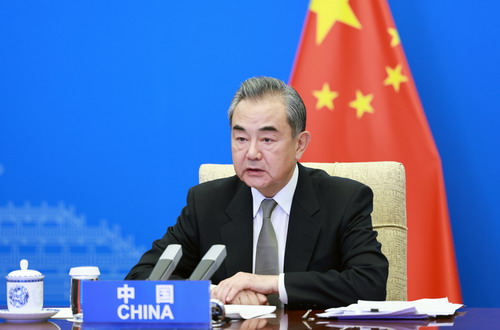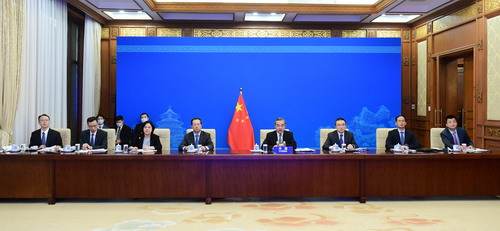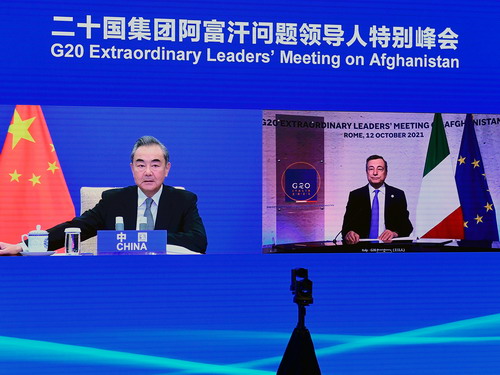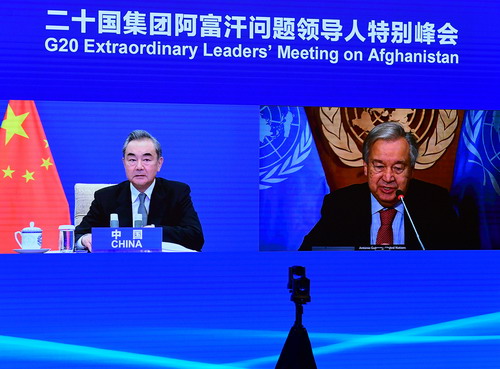Wang Yi Attends the G20 Extraordinary Leaders' Meeting on Afghanistan

On the evening of October 12, 2021, President Xi Jinping's Special Representative, State Councilor and Foreign Minister Wang Yi attended the G20 Extraordinary Leaders' Meeting on Afghanistan in Beijing via video link.
Wang Yi said, Afghanistan today has come to a crossroads which may head to stability and prosperity or chaos and fall. It still has a long way to go before realizing peace and stability in the real sense because of the co-existence of challenges and opportunities, difficulties and hopes. Experience and lessons from Afghanistan over the past two decades have demonstrated again that the right way to get along between countries is the respect for independent choices of development paths, and mutual inclusiveness and mutual learning among different civilizations. Imposing one's own ideology on others, arbitrarily interfering in the internal affairs of other countries, or even resorting to military intervention will only bring about continuous turmoil and poverty, and cause serious humanitarian disasters. The G20 should give full play to its characteristics and advantages to contribute to the peace, stability, prosperity and development of Afghanistan and the region at large, on the basis of respecting the sovereignty, independence and territorial integrity of Afghanistan and supporting the implementation of the basic "Afghan-led and Afghan-owned" principle.

Wang Yi put forward four suggestions:
First, put people's well-being first to help Afghanistan cope with the humanitarian crisis. Afghanistan is currently facing serious difficulties such as food shortage and the spread of COVID-19 infections, and the advent of winter will make the lives of Afghans even harder. All parties should give a helping hand as soon as possible to pull the Afghan people through difficulties and jointly support the United Nations (UN) in playing the coordinating role. China is accelerating the provision of emergency assistance to Afghanistan worth 200 million yuan in food, winter materials, vaccines and medicines. The first batch of materials has been delivered to Afghanistan. It is all the more necessary for the country, which created the current dilemma in Afghanistan in the first place, to learn a lesson and take responsibility to prevent the emergence of a humanitarian crisis and a refugee wave in Afghanistan and avoid bringing new shocks to neighboring countries and the international community.
Second, pursue both current and long-term interests to drive Afghanistan onto an open and inclusive development path. The international community should proceed with dialogue and contact with all parties in Afghanistan from a rational and pragmatic perspective, support the Afghan people in independently choosing a development path suited to their national conditions, encourage and guide Afghanistan to eventually build a broad and inclusive political structure which implements moderate and prudent domestic and foreign policies. The fundamental way out for Afghanistan lies in helping the country continue with the pursuit of peace and reconstruction and achieve benign economic and social development. To this end, the international community should work more in a down-to-earth manner, countries that are still imposing unilateral sanctions on Afghanistan should lift the sanctions as soon as possible, and international financial institutions should increase their funding support for Afghanistan's poverty reduction, infrastructure and other projects.

Third, adopt a zero-tolerance approach to ensure that Afghanistan keeps itself far away from terrorism. It is necessary to promote the relevant Afghan parties to make an early decision and take practical action to root out terrorism; it is also necessary to cause the international community to build a united front against terrorism by abandoning double standards and selective counter-terrorism, so as to prevent Afghanistan from becoming a hotbed and harbor for terrorism again.
Fourth, build broad consensus to promote the formation of synergy among various mechanisms on Afghanistan. The G20 should uphold the role of the UN as the main channel for promoting peace and stability, as well as humanitarian assistance in Afghanistan, and push various multilateral mechanisms on Afghanistan to supplement one another and form synergy. The G20 should build on its position as a forum for international economic cooperation, gather wisdom and facilitate cooperation from the economic perspectives of humanitarian assistance and peace and reconstruction, etc. China is willing to work together with all parties to help Afghanistan usher into a new historic chapter and support the Afghan people in realizing a bright future of peace and prosperity.
The meeting was chaired by Prime Minister Mario Draghi of Italy, the presidency of the G20, and attended by the leaders of G20 members and guest countries and responsible officials of relevant international organizations via video link.

京ICP备18041594号-1
京公网安备 11010202005508号


